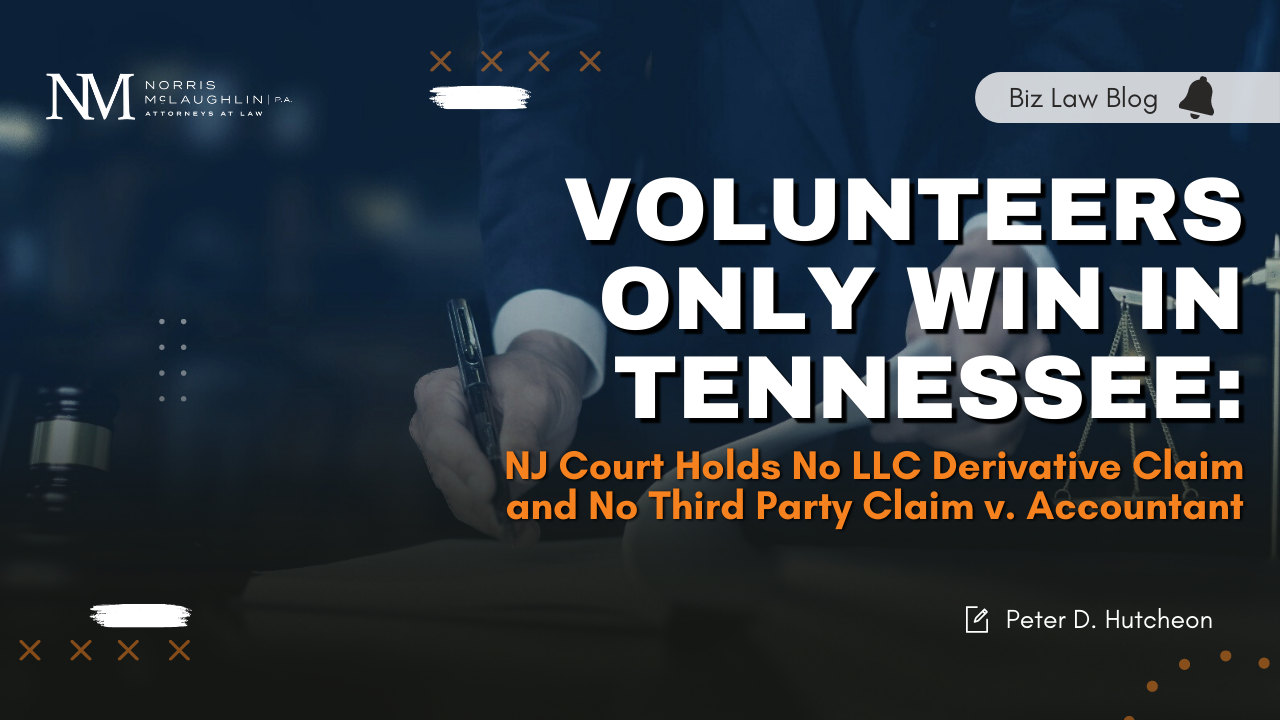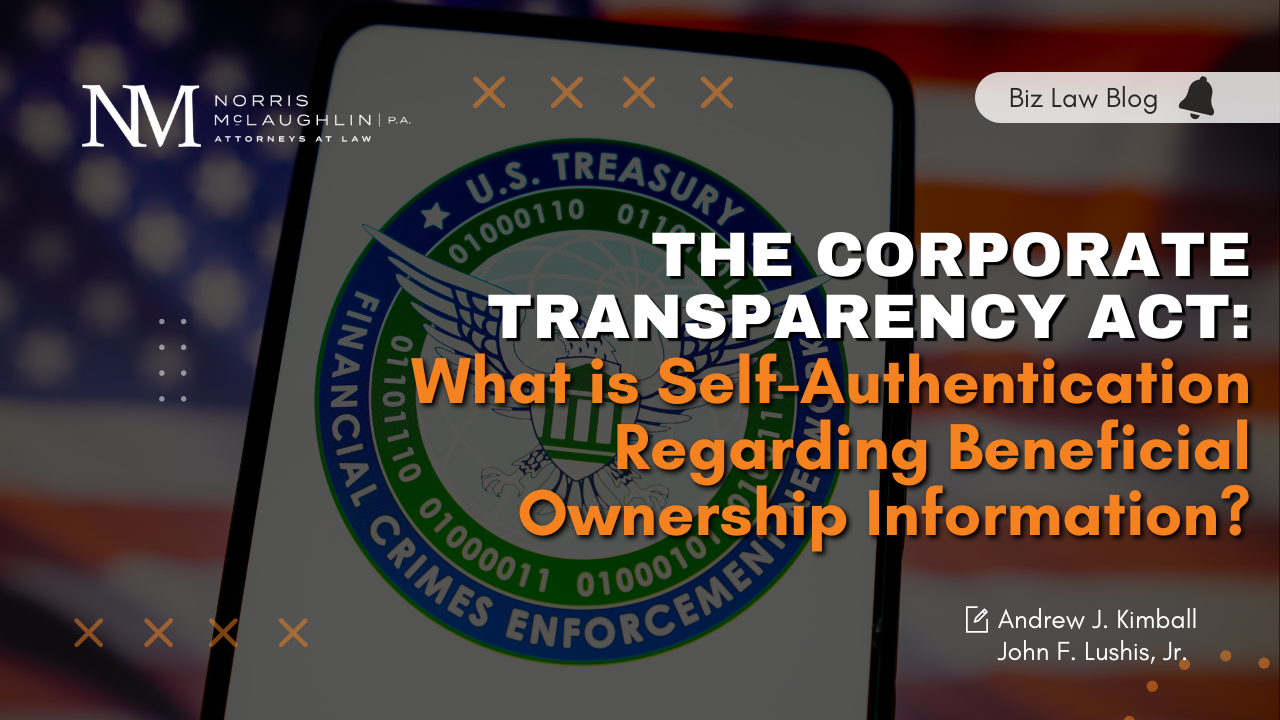Volunteers Only Win in Tennessee: NJ Court Holds No LLC Derivative Claim and No Third Party Claim v. Accountant

In 2004 Arthur Aaron (“Aaron”) and Mark Steinberg (“Steinberg”) formed a New Jersey corporation, A & M Cards Worldwide, Inc. (“Cards”), whose business is not described by either the Trial Court or the Appellate Division. Aaron v. Ortega, Ortega & Di Leonardo, and Does 11 to 20, and Sara Kety LLC., ___N.J. Super___ (Law Div., Bergen Cty., 2021, Dkt. BER-L-001977-21); ___N.J. Super ___(App. Div., 2022), 2022 WL 6593684. In 2008, Steinberg and a Sara Kety (“Kety”) formed a New Jersey limited liability company, Sara Kety LLC (“LLC”), to sell baby clothing. Later Aaron became a member of the LLC with a one-third interest. Steinberg and Kety owned the other two-thirds. In 2009, Cards borrowed $300,000 from the Bank of New Jersey (“Bank”). Aaron and Steinberg guaranteed the repayment of the loan, and for a period of time, for reasons not explained by either Court, LLC “volunteered” and paid the installment payments to the Bank.
After those payments ceased, Bank sued Cards, Aaron, and Steinberg, alleging the default in payment, and seeking recovery from the borrower and/or the guarantors. Aaron responded with counterclaims, crossclaims, and a third-party complaint. In the crossclaims and the third-party complaint, Aaron asserted that Steinberg and Kety had caused the LLC to improperly distribute profits by paying themselves excessive salaries and wrongly charged the LLC for personal expenses, which they labeled “business expenses,” all of which reduced profits that Aaron should have received. In addition, Aaron sued Frank Ortega (“Ortega”) and his accounting firm, Ortega & Di Leonardo (“Firm”). Ortega and the Firm were the accountants for LLC. Aaron sued Ortega and Firm for negligence and for aiding and abetting Steinberg’s and Kety’s breach of fiduciary duties to him and for his own breach of fiduciary duties to Aaron.
In June 2018, Ortega moved to dismiss Aaron’s third-party complaint; in July 2018, while Ortega’s motion was pending, Aaron filed an amended third-party complaint. Ortega’s motion was grounded on the New Jersey Accountant Liability Act (Accountant Act). Aaron’s amended complaint, in addition to the claims against Ortega and the Firm, asserted derivative claims against them on behalf of the LLC. Aaron’s amended complaint was dismissed without prejudice by the Trial Court because Aaron failed to move for permission to file it. The Trial Court also held that Aaron could not bring what was (according to the Appellate Division) “essentially third-party professional negligence claims against Ortega” when Aaron was not a client of Ortega or the Firm because of the Accountant Act. The Trial Court then gave all parties until March 1, 2019, “to file any motions to amend.” That Court then noted “Aaron never sought leave to amend.”
Instead, Aaron filed a new Complaint on March 24, 2021, asserting the same claims against Ortega and the Firm both individually and derivatively on behalf of the LLC. On Aug. 27, 2021, the Trial Court (whose language suggests a level of annoyance with Aaron) granted Ortega’s and his Firm’s motion to dismiss after an extended discussion of the various procedural shortcoming of Aaron’s action, including the entire controversy doctrine, the law of the case doctrine, principles of res judicata and collateral estoppel, and the Trial Court’s prior orders.
Undeterred by the Trial Court’s repeated rejection of his claims, Aaron appealed that decision to the Appellate Division of the New Jersey Superior Court. The Appellate Division reviewed the procedural shortcomings identified by the Trial Court and concurred in the Trial Court’s disposition of Aaron’s claims. But the Appellate Division went further and explored two aspects of Aaron’s claims that it felt warranted a full judicial assessment: first, the scope of the accountant’s liability to third parties, and second, the nature of a derivative suit and the technical requirements necessary to assert one.
The story of accountant liability under New Jersey law is fairly complex. It begins in 1924 in another jurisdiction, when the accounting firm of Touche Niven gave an unconditional audit opinion as to the accuracy of a New York rubber importer, Fred Stern and Company (“Stern”), having failed to discover that Stern’s management falsified entries to overstate accounts receivables. The auditors knew that Stern would use the audited financials to raise money for operations, even providing 32 certified copies to Stern for that purpose. Stern gave one copy of the certified audit to a finance company, Ultramares Corporation, which lent Stern money. In 1925 Stern declared bankruptcy, and Ultramares sued Touche Niven for the amount of the defaulted debt. The Court found Touche Niven negligent, but not a fraud feasor, and dismissed the claim based on the doctrine of privity, i.e., that an accountant, even if negligent, could not be liable to a third party that was not the accountant’s client.
After the intermediate appellate court reversed, the case went to the New York Court of Appeals, Judge (later Justice of the U.S. Supreme Court) Benjamin Cardozo presiding. Judge Cardozo, in a famous ruling, held that the auditors owed no duty to Ultramares, as there was no privity between them, for to hold otherwise would open the “floodgates” of litigation, potentially resulting in “liability in an indeterminate amount for an indeterminate time to an indeterminate class.”
The doctrine of privity provided a substantial liability shield to accountants under New Jersey law until 1983, when the New Jersey Supreme Court held in H. Rosenblum, Inc. v. Adler, 93 N.J. 324, where the Supreme Court, dealing with a supermarket that had gone public only for the investors to learn that its financials were not based on actual inventory and sales, held that an accounting firm could be held liable for negligent misrepresentation, i.e., inadequate audit work.
The Supreme Court was heavily influenced by the claim (and recognition) that the accounting firm had to know that the company would use the financial statements to persuade others to deal with (and potentially lend to) the company at issue. The Court held that under those circumstances, accounting firms “should no longer be permitted to hide within the citadel of privity.” It might be noted that Ultramares remains good law in New York.
As one might suspect, the accounting profession in New Jersey “rose as a man (and woman)” to seek a legislative “correction” to Rosenblum. The lobbying activity of the accounting profession led to the enactment of the Accountant Act (sometimes referred to as the “Privity Statute”) in 1994, which materially limited the scope of accountants’ liability to third parties. The New Jersey Statutes Annotated (“NJSA”) 2A:53A-25 provides (in an edited summary) that:
An accountant can only be held liable to a non-client if the accountant:
- knew at the time of engagement or subsequently agreed, that the financial statements or other accounting service would be given to a third party, who was “defined identified …in connection with a specified transaction (a term);
- knew that the third party would rely on the financial statements or other services “in connection that specified transaction; and
- directly acknowledged to the claimant that the accountant knew that the claimant intended to rely on the financial statements or other services.
The Senate Commerce Committee Statement to Senate Bill No. 826 (Oct.13, 1994) states that the statute was enacted to “limit accountants’ liability to third parties for the accountants’ negligent acts. The [1994] bill restores the concept of privity to accountants’ liability towards third parties.” Further, the Appellate Division held that Aaron had not identified a specific transaction that would bring Aaron’s complaint within the Accountant Act requirement, and had no difficulty in finding that Aaron’s “claims fail to satisfy the three elements” of the Accountant Act. Indeed, the limitations in that Act have been consistently upheld in subsequent judicial proceedings, including Finderne Management Company, Inc., et al., v. James W. Barrett, 355 N.J. Super. 197 (AD. 2002), Cast Art Industries, LLC v. KPMG LLP, 36 A 3d 1049 (N.J., 2012), and, of course, most recently by the Appellate Division in the Aaron case.
Finderne Management involved two small businesses, Finderne Management Company, Inc., and Alloy Cast Products and their principals, who asserted that they had been “fraudulently induced to establish a welfare benefit plan” by three individuals and their respective financial entities. The Plan, known as an EPIC Plan, required employers to fund pre-retirement and post-retirement death benefits for their employees where the employers’ contributions to the Plan (used to pay life insurance premiums) were represented to be tax deductible. Unfortunately, the Internal Revenue Service disagreed, a position upheld in a 1997 Tax Court decision. John Rossi, an accountant, and his firm were engaged by Finderne in 1996. When the IRS issued a deficiency letter due to Finderne’s underpayment of taxes (relying on the supposed deductibility of the Plan contributions), Rossi advised Finderne to cease making payments into the Plan and helped Finderne reach a settlement with the IRS. The Plan insurance policies lapsed before the Finderne principals could convert those policies into personal insurance coverage.
In response to the lawsuit brought by Finderne and its principals against the three individuals and the financial entities, those defendants sued Rossi claiming professional negligence. Both the motion and Trial Court granted Rossi’s motion to dismiss the claims against him and his firm, concluding that the privity provisions of the Accountant Act applied, noting that “[t]he defendants do not allege that they relied on [Rossi’s] professional opinion nor that they had any other relationship with him….there is simply no suggestion whatsoever that he was aware in any way they would rely upon it.” The Appellate Division, after quoting the Accountant Act and citing the Senate Commerce Committee Statement quoted above, compared the reasons the Rosenblum Court gave for waiving the privity requirement in connection with delivering audited financials and found that the policy basis for Rosenblum simply did not apply to the tax-related advice Mr. Rossi gave to Finderne.
The Appellate Division then noted the policy expressed by the New Jersey Legislature in enacting the Accountant Act that “an accountant should not be responsible to third parties for negligent acts,” and apparently feeling reassured in its decision, held that the claims against Rossi must be dismissed, even though, as the Court stated, “we do not address whether Rossi is shielded by the immunity proscribed by…[the Accountant Act].” Hence, the legacy of Rosenblum possibly survived when an accountant was sued in connection with opining on and delivering audited financial statements.
The New Jersey Supreme Court returned to the issue of accountant liability in 2012 in Cast Art Industries, LLC v. KPMG LLP. Cast Art was a California-based business that made decorative figurines. In late 1999 to early 2000, Cast Art became interested in acquiring Papel Gifts, a New Jersey company in the same line of business. After negotiations, Cast Arts and Papel agreed to merge, whereupon Cast Art borrowed $22 million from PNC Bank to finance the transaction. One of the loan conditions was that Cast Art provide the Bank with audited financial statements for Papel for the years 1998 and 1999. KPMG had been Papel’s auditors since 1997. While auditing the necessary financial statements, KPMG became concerned about the lack of cooperation from Papel’s management and some of the revenue recognition procedures used by that company, leading to KPMG issuing an opinion that Papel’s financial condition was such that it might not be able to continue as a going concern. KPMG did not find that Papel was recording transactions as sales where goods were not yet shipped and otherwise materially manipulated both Papel’s sales and the economic value of its accounts receivables. After the merger closed, Cast Art found itself in duress, unable to make scheduled payments on the bank loan, and filed for protection under the Federal Bankruptcy law. Cast Art then sued KPMG for negligence in auditing Papel’s financial statements.
Cast Art prevailed at both the Trial Court (in a 2008 opinion after a 22-day jury trial) and Appellate Division (a 2010 decision) level, holding that the Accountant Act did not protect KPMG because, as in Rosenblum, the accountant knew that the audited financials were a condition of the loan, and relatedly, the merger. These Courts, in following Rosenblum, also noted the implied exception in Finderne Management to the Accountant Act shield where audited financials are delivered to a third party and the accountant knows that will occur. The New Jersey Supreme Court, in a 5-0 opinion (with two Justices not participating), reversed. It held that the Accountant Act did, indeed, restore the privity requirement, focusing largely on an amendment to the Act during the legislative process, which added the phrase “by the client” after “engagement” so that the accountant’s duty runs ONLY to the client. Thus, the Court said, “Cast Art failed to establish that KPMG ‘knew at the time of the engagement by the client’ or thereafter agreed that Cast Art could rely on its work in proceeding with this merger” and therefore failed to meet the requirements of the Accountant Act to establish liability. The Court remanded the case to the Trial Court with instructions to dismiss the Cast Art claims. An entirely irrelevant side-story was the identity of Cast Art’s attorney, the since disbarred Michael Avenatti of Stormy Daniels fame. In any event, Aaron’s claims, similarly to the Cast Art claims, failed.
The Appellate Division in Aaron then addressed another barrier to one of his claims, the claim brought on behalf of the LLC. The distinction between a derivative claim and a direct claim is somewhat complex. In a direct claim, the claimant – a member of a limited liability company, a limited partner in a limited partnership, or a shareholder in a corporation – brings the claim directly against the entity, and perhaps against others. In a derivative claim, the claimant brings the claim on behalf of the entity (limited liability company, limited partnership, or corporation), where the entity itself has the legal right to assert the claim but has not done so. Here the claimant essentially brings a mandamus action against the entity to “force” it to assert its rights. Unfortunately, it is not always simple to distinguish one type of claim from another, a particular problem when the courts do not necessarily have extensive experience in dealing with claims relating to business entities.
In New Jersey that complex of issues can be made more difficult when having to choose at the outset whether to bring a claim at law in the Superior Court, Law Division, or a claim in equity in the Superior Court, Chancery Division, where the choice of Court depends on the remedy sought. For a discussion of the requirements to bring a derivative claim, see Brown v. Brown, 323 N.J. Super 30 (App Div., 1999). See also (as useful background on this issue), Kleinberger and Bergmanis (1996) “Direct vs. Derivative, or ‘What’s a Lawsuit Between Friends in an ‘Incorporated Partnership’?” Faculty Scholarship Paper published by Mitchell Hamline School of Law Open Access.
Bringing a derivative lawsuit involves a number of specific requirements:
- the proposed plaintiff must be a member, a limited partner, or a shareholder (each a “representative” for this discussion) of the relevant entity both at the time of the act or omission that is the gravamen of the suit or become a representative by operation of law (e.g., the heir of a deceased representative);
- the representative must remain a representative (i.e., by remaining a member, partner, or shareholder) during the entire litigation;
- the representative must fairly and adequately represent the collective interests of all representatives in the entity;
- the representative must make a written demand on the managing body (or person) of the entity, to bring the claim on behalf of the entity;
- the representative must be prepared to show that a non-answer or a refusal to act in response to the demand is not entitled to deference under the business judgment rule (which presumes that a managing body or person decision is in the best interest of the entity, unless it can be shown that the non-answer or refusal involves a conflict of interest or is manifestly unreasonable given the facts of the case); and
- the representative must be prepared to challenge any decision not to bring the claim based on the decision of a special litigation committee.
Clearly, the decision to bring a derivative claim should not be taken lightly.
Until New Jersey adopted the Revised Uniform Limited Liability Company Act (“RULLCA”), which became effective on March 18, 2013, New Jersey’s Limited Liability Act in NJSA 42: 2B-61 provided that a derivative suit by a limited liability company member required only items i and ii in the prior paragraph. As of March 18, 2013, RULLCA in NJSA 42: 2B-68 through 72, requires compliance with the full panoply of steps noted in order to bring a derivative suit. Shapiro Croland’s attorney, Eric D. Reiser’s article (2016) “New Jersey LLC Derivative Lawsuits: Do I Have Standing To Sue?” discusses in detail this aspect of New Jersey’s version of RULLCA. Interestingly, at the same time as RULLCA was adopted in New Jersey, the New Jersey Business Corporation Act of 1968 was amended to add new subsections to NJSA 14A: 3-6 spelling out similar detailed derivative lawsuit requirements.
As noted above, Aaron included a derivative claim against Ortega and his Firm on behalf of the LLC, of which he was a member. The Appellate Division said, “Aaron did not show that he made a demand on the other members of [the LLC] prior to filing the derivative action.” The Court acknowledged that Aaron “did plead ... that such a demand would be futile because the other members … benefitted from [Ortega’s and his Firm’s]alleged negligence … The allegations, however, were conclusory… in response to the …summary judgment motion, Aaron failed to identify facts that would demonstrate his right to bring a derivative action…” Accordingly, the Appellate Division affirmed the dismissal of Aaron’s complaint.
If you have any questions concerning this post or any related matter, please feel free to contact me at pdhutcheon@norris-law.com.




